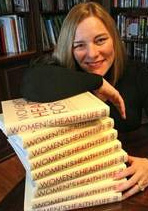

Book Excerpt from Women's Health for Life: Your 30's--Fertility and Sexual Health
 The following is part four of a five-part excerpt of the new book, Women's Health for Life (DK 2009). Women's Health for Life is a unique compilation of women's health information, designed to help women optimize their health, well-being, and quality of life. Edited by women's health expert and advocate, Dr. Donnica Moore, this book is team written by women physicians for women readers. It discusses topics from contraception to infertility; migraines to menopause; cervical cancer to colon cancer; and heartburn to heart disease. While many readers will want to read this book from start to finish, it provides easy access to specific information when it's needed. Uniquely, this book provides clear illustrations, graphs, and charts making it as easily understood as a cookbook. While, there is no single "recipe" for good health, the many ingredients are discussed in this book's 16 chapters. Organized by bodily system, each chapter starts out with an explanation of how that system works and ways to maintain healthy function through diet, exercise, and other self-help measures. This is followed by an explanation of some of the medical conditions affecting that particular system and how they should be treated, focusing specifically on recommendations for women. To order Women's Health for Life from amazon.com, click here:
The following is part four of a five-part excerpt of the new book, Women's Health for Life (DK 2009). Women's Health for Life is a unique compilation of women's health information, designed to help women optimize their health, well-being, and quality of life. Edited by women's health expert and advocate, Dr. Donnica Moore, this book is team written by women physicians for women readers. It discusses topics from contraception to infertility; migraines to menopause; cervical cancer to colon cancer; and heartburn to heart disease. While many readers will want to read this book from start to finish, it provides easy access to specific information when it's needed. Uniquely, this book provides clear illustrations, graphs, and charts making it as easily understood as a cookbook. While, there is no single "recipe" for good health, the many ingredients are discussed in this book's 16 chapters. Organized by bodily system, each chapter starts out with an explanation of how that system works and ways to maintain healthy function through diet, exercise, and other self-help measures. This is followed by an explanation of some of the medical conditions affecting that particular system and how they should be treated, focusing specifically on recommendations for women. To order Women's Health for Life from amazon.com, click here:
The following segment is taken from Chapter 2, "Understanding the Changes" which gives a decade-by-decade overview of the physiologic and psychologic changes women experience as we age. It also serves to remind us of the common sense rules of health that many of us are liable to forget. Much of that information is given in the section focusing on the 20's, so don't skip over this, even if you're older!
The 30s are generally considered a time of robust health for most women, but this decade can also be a transitional time in terms of your physical and emotional well-being. One of the biggest physical and psychological health issues may be learning to take care of your own health needs, despite the competing demands of caring for others or focusing on your career and relationships.
For many women, their 30s (and increasingly their 40s) are a time when they face fertility challenges and concerns. A growing percentage of women delay pregnancy until their 30s. While this is a relatively small proportion, a woman over 35 not only has a greater risk of infertility, but is also considered to be of "advanced maternal age," which carries medical risks for the mother. For example, if you give birth to your fi rst child after the age of 35, you have approximately twice the risk of developing breast cancer as a woman who gave birth before the age of 20. A woman who has never given birth has a significantly increased risk of ovarian cancer.
Years ago, women over 35 were'nt allowed to take the contraceptive pill. We now know that it is safe for healthy, nonsmoking women over 35 to continue taking low-dose oral contraceptives as long as they have no other contraindications.
While the average age of menopause is 51, many women enter it earlier, either naturally, surgically (by removal of the uterus or the ovaries), or as a result of chemotherapy or radiation. This may well happen during the 30s. Then there is a condition called premature ovarian failure (POF), which is estimated to affect 1 in 100 women between the ages of 30 and 39. In fact, women can be affected with POF at any age, even during their teens. Statistics show the average age of POF in the US is 27.5 years.
Fertility is not the only physiological factor which declines in your 30s. Ironically, 35 is a "magic number" of sorts in women's health. You may notice the beginning of agerelated visual changes after 35 and many women may notice changes in their hair color and in their skin. It's also a turning point because you are at increased risk of a number of medical problems and concerns, including:
- miscarriage
- birth defects (notably Down syndrome; see chart, opposite)
- depression
- breast cancer
- the beginning of bone loss
- slower metabolism, which may take it more diffi cult for you to lose weight
- fi broids
- high blood pressure
- autoimmune diseases

Created: 9/27/2009 - Donnica Moore, M.D.



